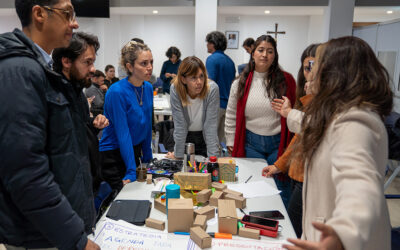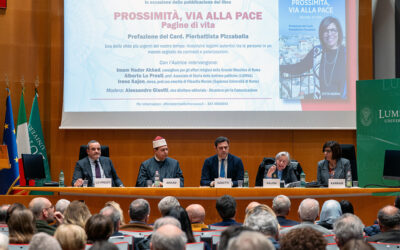 What significance did Maria Voce’s visit have for the Focolare Movement present in the Holy Land? It gave us all great encouragement. New possibilities were opened and new contacts were made, especially in civic and academic fields. It was like a moment of harvest; we could see the fruit of the work done in these past 33 years of the Focolare Movement’s presence here. The most important aspect, however, was the hope that Maria Voce gave to all those she met: a hope strengthened by the spirit of love and unity typical of the Focolare Movement. Her words are engraved on each of our hearts: “You are here not only for the local community but also for the whole Focolare Movement. You have a task, a mission to carry out. I believe you are one of the most precious pieces of the Movement’s ‘big mosaic’.. Nobody can substitute you and this good fortune is yours, this grace is yours”. Were there developments with regards to the Movement’s future perspectives in such a multifaceted contest?
What significance did Maria Voce’s visit have for the Focolare Movement present in the Holy Land? It gave us all great encouragement. New possibilities were opened and new contacts were made, especially in civic and academic fields. It was like a moment of harvest; we could see the fruit of the work done in these past 33 years of the Focolare Movement’s presence here. The most important aspect, however, was the hope that Maria Voce gave to all those she met: a hope strengthened by the spirit of love and unity typical of the Focolare Movement. Her words are engraved on each of our hearts: “You are here not only for the local community but also for the whole Focolare Movement. You have a task, a mission to carry out. I believe you are one of the most precious pieces of the Movement’s ‘big mosaic’.. Nobody can substitute you and this good fortune is yours, this grace is yours”. Were there developments with regards to the Movement’s future perspectives in such a multifaceted contest?  Without a doubt there is a clear dedication to all areas of dialogue. This involves, first and foremost, the fostering of an ever closer unity between the ecclesial movements present in the Holy Land. What’s more, various bishops encouraged our involvement in pastoral work for families and young people. We also felt the need to respond to the request of many interreligious organizations to create a more hands-on collaboration; there is a true desire to spread the spirit of universal brotherhood and to work together for the common good and for peace between members of different religions. We cannot forget the contacts made with the city council in Jerusalem and with other local councils in the Palestinian Authority. All in all, guidelines for building bridges at every level have come to the fore. Maria Voce met with representatives not only of the Catholic church but also of other churches and religions. How meaningful were these meetings? These visits were very much appreciated by the patriarchs and bishops of other churches. They underlined the importance of the Charism of Unity and the need for a solid and deep spirituality in the ecumenical field. As a result these church leaders asked for our involvement in various projects within their churches and in interreligious organisations. Did a specific priority emerge after the Focolare President’s visit to the Holy Land? It’s difficult to narrow down one specific priority because everything was so important.
Without a doubt there is a clear dedication to all areas of dialogue. This involves, first and foremost, the fostering of an ever closer unity between the ecclesial movements present in the Holy Land. What’s more, various bishops encouraged our involvement in pastoral work for families and young people. We also felt the need to respond to the request of many interreligious organizations to create a more hands-on collaboration; there is a true desire to spread the spirit of universal brotherhood and to work together for the common good and for peace between members of different religions. We cannot forget the contacts made with the city council in Jerusalem and with other local councils in the Palestinian Authority. All in all, guidelines for building bridges at every level have come to the fore. Maria Voce met with representatives not only of the Catholic church but also of other churches and religions. How meaningful were these meetings? These visits were very much appreciated by the patriarchs and bishops of other churches. They underlined the importance of the Charism of Unity and the need for a solid and deep spirituality in the ecumenical field. As a result these church leaders asked for our involvement in various projects within their churches and in interreligious organisations. Did a specific priority emerge after the Focolare President’s visit to the Holy Land? It’s difficult to narrow down one specific priority because everything was so important.  Maria Voce felt the need to strengthen the Focolare’s presence in the Holy Land after the requests of many local figures. She also emphasised the importance of the project “In the Footsteps of Jesus”– a project that organises hospitality and cultural activities for groups of pilgrims- encouraging it to go ahead with the input of the whole Focolare community in the Holy Land. Finally, a quick mention about the piece of land beside the church of Saint Peter in Gallicantu: a plot adjacent to the steps where, according to tradition, Jesus prayed to the Father for unity among all men and where Chiara Lubich dreamt of one day setting up a focolare. Maria Voce confided, “Notwithstanding the difficulties we won’t give up, we won’t give up because it is part of out spirituality, in a certain sense it’s part of the charism”. For now there is the possibility to develop a large park that could be used for open air meetings or other activities. By Roberto Catalano
Maria Voce felt the need to strengthen the Focolare’s presence in the Holy Land after the requests of many local figures. She also emphasised the importance of the project “In the Footsteps of Jesus”– a project that organises hospitality and cultural activities for groups of pilgrims- encouraging it to go ahead with the input of the whole Focolare community in the Holy Land. Finally, a quick mention about the piece of land beside the church of Saint Peter in Gallicantu: a plot adjacent to the steps where, according to tradition, Jesus prayed to the Father for unity among all men and where Chiara Lubich dreamt of one day setting up a focolare. Maria Voce confided, “Notwithstanding the difficulties we won’t give up, we won’t give up because it is part of out spirituality, in a certain sense it’s part of the charism”. For now there is the possibility to develop a large park that could be used for open air meetings or other activities. By Roberto Catalano
Give with joy
Give with joy




0 Comments